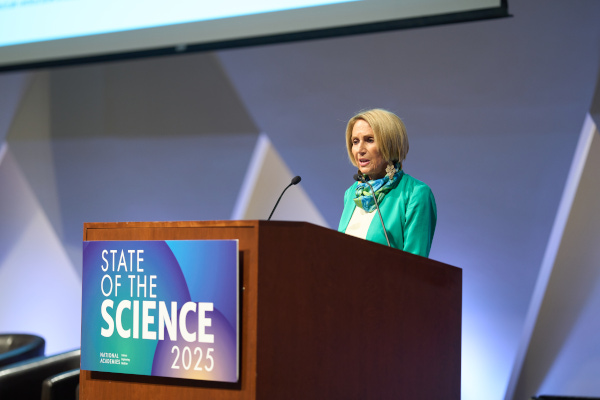
By Marcelo Jauregui-Volpe
More science and technology training programs that quickly advance careers, developing alternative approaches to peer review, and using artificial intelligence to help researchers breeze through administrative paperwork–these were some of the strategies National Academy of Sciences President Marcia McNutt outlined in her second annual “State of the Science” address for how the United States can regain global scientific leadership.
In her address, McNutt warned that the United States “is not on a sustainable path for global research leadership and it has not been on such a path for quite a few years now.” She highlighted how research and development investments have stalled in the United States and how there are not enough professionals to fill jobs in science, technology, engineering, and mathematics fields. Meanwhile, China is churning out more research papers and leading in several critical technologies, such as artificial intelligence, quantum, and biotechnology.
“Unless we want the 21st century to be the China century, we need to innovate,” said McNutt.
McNutt argued for a “radical upgrade” of the “Endless Frontier model,” referencing the 1945 report by presidential advisor Vannevar Bush that laid the groundwork for American scientific and technological dominance.
One of the main inhibitors of the American scientific enterprise, McNutt argued, is excessive regulation, which bogs down researchers with paperwork and makes it difficult for international students to get visas to stay in the United States. McNutt also expressed concern that the Trump administration’s current focus on “waste, fraud and abuse” will result in “more regulations, as everyone is assumed guilty until proven innocent.”
To course correct, McNutt outlined seven opportunities for improving U.S. scientific leadership: 1) changing the proposal review model to greenlight more high-risk, high-reward research; 2) creating a national research strategy with input from the public and private sectors and academia; 3) improving K-12 education; 4) rethinking STEM pathways; 5) reducing red tape in immigration and reducing regulatory burdens on researchers; 6) embracing international partnerships; and 7) cultivating trust in science.
McNutt’s address was followed by a panel discussion moderated by Kelvin Droegemeier, professor and special advisor to the chancellor for science and policy at the University of Illinois Urbana-Champaign. The panel featured Arizona State University President Michael Crow, University of California, Berkeley Professor of Engineering Tsu-Jae Liu, Office of Science and Technology Policy Principal Deputy Director Lynne Parker, and University of Texas at El Paso President Heather Wilson.
Crow argued that spurring more innovation begins with transforming academic culture, which he described as rigid. He admitted that changing academia would be difficult, citing his own experience at ASU, where leadership eliminated certain academic departments and created transdisciplinary schools to become a “frontline, combat level research university.”
Crow also suggested that research projects should always have specific goals that serve the needs of the nation.
“The goal can be fundamental understanding, but fundamental understanding for what? What does the democracy need the science to do?” he said.
Marcelo Jauregui-Volpe is editorial and communications assistant at AAU.